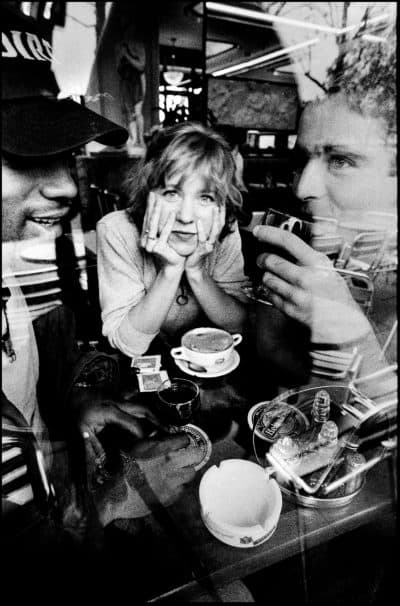Advertisement
Throwing Muses' Kristin Hersh Reflects On Life And Nearly Four Decades Of Music

Kristin Hersh, co-founding singer-songwriter-guitarist of Throwing Muses, is on the phone talking about the responsibilities that come with her job, a job she’s had, more or less, since she was a teenager. She turned 54 last month. For a moment, Hersh fantasizes about having done her work anonymously over the years, absent the star-making machinery.
“All I ever really wanted to do was mail songs out,” she says. “I thought that should be a job, where you don’t have to attach your name or face to it or make videos. I don’t mind talking about music with people who love it, but I’m very, very shy. I wouldn’t be performing if it wasn’t a chance to disappear into the music.”

Ideally, the music is refuge or comfort for both the player and the listener. Discussing the vagaries of “Sun Racket,” the new album by the veteran art-rockers released in early September, Hersh says, “It only has two sonic vocabularies. I’m used to working with a lot [more]. It’s just there were these two really disparate elements of a similar approach. I thought ‘Somehow, I have to combine them.’ They’re two very different sides of the same coin, I suppose.”
And those are? Hersh pauses for a moment. “One is really heavy, rolling, hypnotic and distorted and the other is like a music box — delicate with sound effects, like field recordings, a layered technique but quiet.”
Welcome to Throwing Muses circa 2020, a trio that includes bassist Bernard Georges and drummer David Narcizo, a unit that’s been intact since 1992. In 1983, Hersh co-founded the band with her stepsister, singer-guitarist Tanya Donelly, and the duo started playing together when they were in high school, where they were branded “art chicks” by classmates. (They agreed — the term fit.) Donelly, who later co-formed The Breeders and fronted Belly, has not been a regular Muse for three decades, though she’s taken the stage occasionally over the years.
Hersh was raised in Newport, Rhode Island, and as a teenager, was bred in Boston rock ‘n’ roll clubs. Her young band was signed by the prestigious and adventurous U.K. label 4AD, their first American signing. Hersh is currently a Californian, but is, at present, back in New England. She is halfway through recording a new album with her punkier offshoot group 50FootWave, starting a solo disc and planning yet another Muses musical offering. While, of course, chatting up the just-released “Sun Racket,” their tenth album and first in seven years.
“I have a lot of overlapping projects,” says Hersh. “I am maybe a bit of a spaz in that regard. I don’t know if I should be making three records, but I don’t know what else to do. I don’t know how to stop.”
And she’s editing a final draft on her second memoir, a follow-up to 2010’s “Rat Girl.” This one is tentatively titled “Seeing Sideways.” It’s about her many years on the road as a touring musician, traveling the globe with her band and four sons. (Her ups, downs and traumatic breakup with ex-husband/manager Billy O’Connell will no doubt factor in, too.)
“The publisher wanted a book about raising kids on the road,” Hersh says, “and I thought, ‘I get why you might say that, but you’ve met kids and you’ve been on buses — it’s not that fascinating a subject.’ It’s a great way of life, but I don’t know if it’s going to make an interesting book. But if you’re writing about 30 years, you have the opportunity to take out all of the boring stuff and I did. What is left is devastating. It makes my life seem breathless, like a cliff dive.” She laughs. “When I sent it in, the editor said, ‘This is easily the strangest book I’ve ever read.’”
Hersh claims to be no fan of “strange” — “I was a biology major and I want everything to make sense” — but the word can’t help but be applied to her journey through life and music. Hersh’s history includes a bipolar diagnosis (which she disagreed with) and PTSD, which she says, revealed dissociative disorder. Her treatment for the latter included psychotherapy and EMDR (Eye Movement Desensitization and Reprocessing), which she began about seven years ago.
“When I went through EMDR, that changed my writing technique,” she says. Hersh contends she was “literally” not present for writing, performing or recording over the years. “Whenever my music was playing or I was playing it,” she says, “it was another part of me. Even my bandmates will tell you, ‘Oh, Kristin disappears when she plays — it’s what she does.’ When I said I wasn’t responsible for the material, I meant that. I was Kristin saying ‘I wasn’t there, I don’t know anything about it.’ But now I do.”
Listeners may not be able to discern a difference, but Hersh says, “I’m more like the songs now, the songs are more like me.”
At one point, she says she was ready to give up music, saying that it was so overwhelmingly powerful, it played an oddly blinding role in her life. “I thought it was a coping mechanism that I no longer needed,” she says. “But that wasn’t the truth; the truth is I had become integrated [with the music].”
Hersh’s alluring and oft-hooky songs remain hallucinatory and abstruse, the fragments or narrative open to interpretation. There’s a lot of water imagery on “Sun Racket.” One song, “Bywater,” reimagines Freddie Mercury as a goldfish in a toilet bowl. Hersh and her bandmates had numerous songs to sift through and edit when they began the album three years ago. Many of the initial ideas were scrapped, not unusual for the band.
“The songs have to tell you what they want in the moment,” says Hersh. “Just like kids. If you tell ‘em what to do, they’re either gonna pout or be kinda lame.”
As a lyricist, Hersh can be harsh, even when the music glides and chimes. In the dream-poppy “Sue’s,” Hersh sings, “The devil has no soul/ doesn’t love who he f---s/ plays his cards wrong/ down on his luck/ but the boy’s a barometer/ polaroid of god.”
Was this inspired by the tumultuous breakup with her ex, Billy?
“It could be,” Hersh says with a laugh that she can allow herself now with some distance. She says her songs may be idiosyncratic but have to have a kind of universal appeal. “You have to have lived it or you can’t tell it, but if you’re saying, “Look at me and my story!’ then you’ve missed the point.”
Throwing Muses has long been considered a band people believe in, something more than a passing fad. Asked if people still believe, Hersh says, “I don’t know. My job is so focused I’m not good at anything else, but I am realizing the listener vs. fan equation gives us strength. We just don’t do the sycophant-rock star equation. That’s not appropriate for what we do. Our listeners don’t want autographs. They treat us like electricians and we fill their house with music.”
The ARTery contributor Jim Sullivan hosted the cable TV show Boston Rock/Talk on Comcast in 2015 and 2016. He spoke with Kristin Hersh in 2015 about her career, from Throwing Muses to her work as a solo artist.





